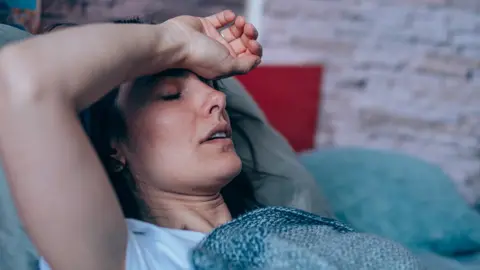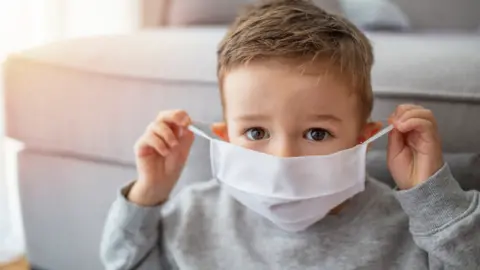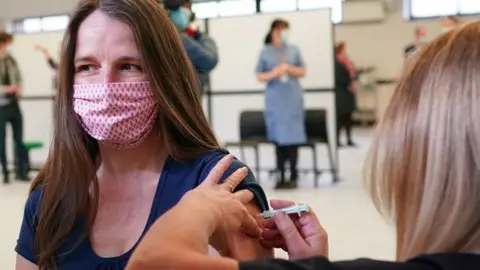Long Covid: What is it and what are the symptoms?
 Getty Images
Getty ImagesThe Office for National Statistics (ONS) estimates about 1.5 million people in the UK have "long Covid".
Most people who catch Covid don't become severely ill and get better relatively quickly.
But some have long-term problems after recovering from the original infection - even if they weren't very ill in the first place.
What are long Covid symptoms?
Long Covid isn't fully understood, and there's no internationally-agreed definition - so estimates of how common it is, or what the main symptoms are, vary.
Guidance for UK health professionals refers to symptoms that continue for more than 12 weeks which cannot be explained by another cause.
According to the NHS, these can include:
- extreme tiredness
- shortness of breath, chest pain or tightness
- problems with memory and concentration ("brain fog")
- changes to taste and smell
- joint pain
But patient surveys suggest a range of other symptoms may also be present, including gut problems, insomnia and vision changes.
It is crucial to remember these symptoms can have other causes too.
There's a lot of research investigating the potential long-term impact of coronavirus.
One study suggests Covid may affect the brain, with a slight shrinkage in size visible after infection.
Another suggests some people with long Covid have lung abnormalities.
But the significance of these changes and whether they are permanent is unknown.
And the severity of problems also varies enormously. Some people will have no issues continuing with their day-to-day lives, while others may struggle.
How will I know I have long Covid?
There is currently no standard test.
People suspected of having it are checked for other issues like diabetes, thyroid function and iron deficiency first, before being offered a long Covid diagnosis.
A blood test could become available in the future.
What causes long Covid?
We don't know.
It could be that the initial infection sends some people's immune systems into overdrive, meaning they attack not just the virus but their own organs.
The virus entering and damaging our cells might explain some symptoms like a loss of smell and taste, while damage to blood vessels could, for example, contribute to heart problems.
It is likely several different things are going on in different people, causing a wide range of problems.
Who gets long Covid and how common is it?
This is difficult to pin down because medics only recently started recording long Covid.
The ONS estimates about 1.5 million people in the UK have symptoms for more than four weeks. Of those, 71% first caught the virus at least 12 weeks previously, and 45% at least a year earlier.
The ONS asked people to record their own symptoms, and suggests the condition is most common in:
- 35 to 49-year-olds
- women
- people with underlying conditions which limit their activities
- those working in health, social care or education
- people living in poorer areas
What about children?
Children are less likely than adults to catch Covid and therefore less likely to develop long Covid - but some still do.
In August 2020, leading experts said they were reassured after a large study showed persistent symptoms were less common than first feared.
 Getty Images
Getty ImagesA team of researchers investigated more than 200,000 positive cases among 11 to 17-year-olds in the UK between September 2020 and March 2021.
They estimated that between 4,000 and 32,000 were still experiencing symptoms 15 weeks later.
We don't know how severe the symptoms were, although there was little evidence that children were left bedridden or unable to attend school.
However, researchers stress the risk to young people is "not trivial", and say it is vital that children get the right medical support.
What treatments are available?
About 90 long Covid assessment centres have been set up across England.
Similar clinics have opened in Northern Ireland, while in Scotland and Wales patients are referred to different services, depending on their specific symptoms.
Currently there are no proven drug treatments, with the main focus on managing symptoms and gradually increasing activity where possible.
Studies on how best to improve the lives of people with long Covid are continuing.
 Getty Images
Getty ImagesCan the vaccine help?
Some reports suggest people who have been vaccinated are less likely to have long Covid.
Vaccines help stop people contracting the virus in the first place - but infections can still occur, particularly when immunity starts to wane. Their main job is to prevent people getting very sick with Covid.
They may also improve Covid symptoms, either immediately or over several weeks.
And there is some evidence that jabs may help prevent infections "turning into" long Covid.

- BOOSTER: Who can get the fourth jab and how do you book it?
- SYMPTOMS: Is a runny nose a cold or Covid?
- TESTS: Who can still get free tests?
- ISOLATION: What is the Covid isolation advice now?
- MANAGING COVID: How to look after yourself at home
- COVID CASES: How many cases are there in my area?
- TREATMENT: What progress is being made?

